In today’s business environment, selecting the right software systems can significantly enhance operations and improve both employee and customer satisfaction. Two essential tools in achieving this are Enterprise Resource Planning (ERP) and Customer Relationship Management (CRM) systems. Both are designed to meet the evolving needs of businesses, yet they serve different purposes and offer unique benefits. This blog post will delve into ERP and CRM, compare their differences, and guide you in choosing the right solution for your organization.
What is ERP?
ERP, or Enterprise Resource Planning, is software designed to manage various operational resources within a business. It acts as a centralized system that integrates different functions, such as finance, inventory, human resources, and supply chain management, into one complete package. By consolidating these processes, ERP systems streamline operations, reduce manual work, and provide real-time insights into the business.
Key Benefits of ERP:
Centralized Data Management: ERP systems store all critical business data in one place, making it easier to access and manage.
Automation of Processes: Tasks that previously required manual input are automated, leading to increased efficiency and reduced errors.
Improved Collaboration: By integrating different departments, ERP systems enhance communication and collaboration within the organization.
Cost Efficiency: ERP systems help businesses optimize resource allocation and reduce operational costs.
ERP systems are particularly beneficial for industries with complex operations, such as manufacturing, retail, and construction. These sectors often require tight coordination between various departments, making ERP a valuable tool for managing and streamlining processes.
What is CRM?
CRM, or Customer Relationship Management, focuses on managing and improving interactions with customers. CRM systems are designed to help businesses track customer behavior, manage relationships, and enhance customer satisfaction. By organizing customer data and automating sales processes, CRM systems enable companies to better understand their customers and tailor their strategies accordingly.
Key Benefits of CRM:
Customer Data Management: CRM systems organize customer information in a centralized database, making it easier to access and analyze.
Sales Automation: By automating sales processes, CRM systems help businesses track leads, manage follow-ups, and close deals more efficiently.
Improved Customer Service: CRM tools offer features that enable businesses to provide better customer support and build stronger relationships.
Enhanced Marketing Strategies: CRM systems provide insights into customer behavior, helping businesses create more targeted marketing campaigns.
CRM systems are especially valuable for industries that rely heavily on customer interactions, such as sales, marketing, and customer service-oriented businesses. By improving customer relationships, CRM systems help businesses increase sales and foster customer loyalty.
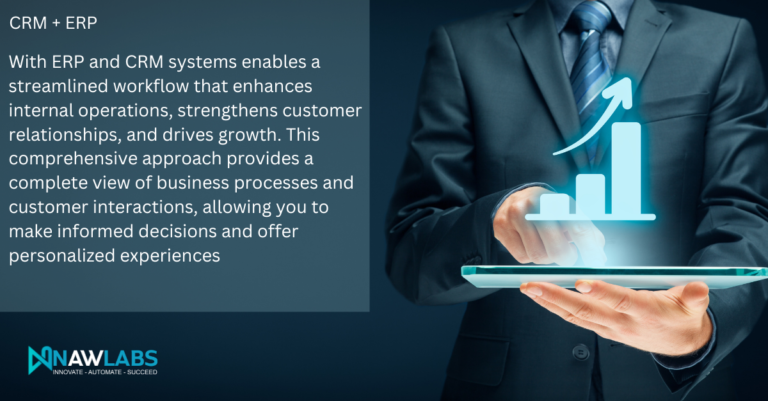
ERP vs CRM: The Core Difference.
Both ERP and CRM are important for businesses but serve different purposes. Here’s the difference:
Focus and Purpose:
ERP: Internal business processes and operations. To streamline and integrate functions across finance, HR and supply chain.
CRM: Customer relationships and interactions. To improve customer satisfaction, sales and build customer relationships.
Users within the Organization:
ERP: Used by finance, HR, production, supply chain. A tool for internal processes and operations.
CRM: Used by sales, marketing and customer service teams. A tool for external customer interactions.
Data Management and Processing:
ERP: Manages internal data like inventory levels, financial transactions and employee records. ERP helps organizations to optimize resource allocation and overall efficiency.
CRM: Manages external data about customers like contact information, communication history and purchase patterns. CRM helps organizations to build customer relationships and drive sales.
ERP vs CRM: Key Benefits
Both ERP and CRM systems offer unique advantages to businesses, depending on their needs:
Advantages of ERP:
Efficiency: By integrating various functions, ERP systems reduce duplication of work and streamline operations.
Better Decision-Making: ERP systems provide real-time data and comprehensive reporting, enabling managers to make informed decisions.
Scalability: ERP systems can grow with the business, making them suitable for companies of all sizes.
Advantages of CRM:
Customer Relationships: CRM systems help businesses better understand and meet customer needs, leading to improved relationships and increased sales.
Sales Growth: By automating sales processes, CRM systems help businesses close deals faster and increase revenue.
Customer Retention: CRM systems provide tools for improving customer service, leading to higher customer satisfaction and loyalty.
When to Choose ERP Over CRM?
While both ERP and CRM are great, there are times when ERP is the better choice for your business:
Complex Operations: If you have complex operations that require multiple departments to work together, then ERP is a must. ERP systems are designed to integrate all functions and streamline processes, so perfect for businesses with many workflows.
Need to Automate: If automation of internal processes is top priority, then ERP can reduce manual work and improve productivity. By automating tasks like inventory management, payroll and production planning, ERP frees up time and resources for other important tasks.
Businesses That Need ERP:
Manufacturing: ERP is perfect for managing production schedules, inventory levels and supply chain. By integrating these functions, ERP helps manufacturers optimize resource allocation and reduce costs.
Retail: Retailers can use ERP to manage inventory, finances and customer data in one system. This integration helps retailers simplify operations, improve customer service and increase profit.
When to Choose CRM Over ERP?
On the other hand, certain scenarios may make CRM the better choice for your business:
1. Customer-Centric Business: If your business revolves around customer interactions, a CRM system is essential. CRM systems help businesses manage customer relationships, track customer behavior, and tailor their strategies accordingly.
2. Focus on Sales: If your primary goal is to increase sales and improve customer relationships, a CRM system is the way to go. CRM systems provide tools for automating sales processes, tracking leads, and managing follow-ups, making them ideal for sales-oriented businesses.
Business Types That Benefit from CRM:
Sales Organizations: CRM systems help sales teams track leads, manage contacts, and close deals more efficiently. By automating sales processes, CRM systems enable sales teams to focus on building relationships and increasing revenue.
Customer Service-Oriented Businesses: CRM systems provide tools for managing customer inquiries, support tickets, and service requests. By improving customer service, CRM systems help businesses increase customer satisfaction and loyalty.
ERP and CRM Integration: Why and How?
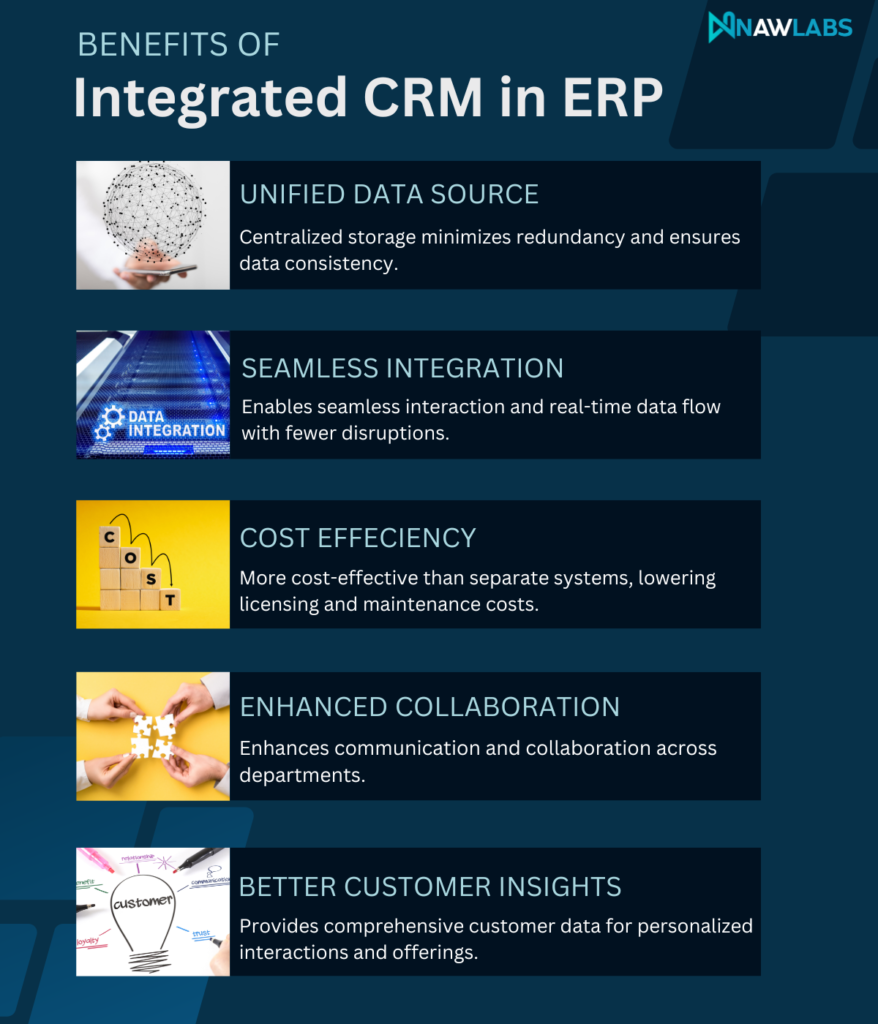
While ERP and CRM systems serve different purposes, integrating them can give you a complete solution for both internal operations and customer interactions.
Benefits of ERP and CRM Integration:
Unified Data Source: Integration means data flows seamlessly between ERP and CRM systems, giving you a complete view of the business. No more separate databases, no more data redundancy and no more inconsistency across all business functions.
Seamless Integration: No more switching between systems, integration streamlines processes and makes life more efficient. Teams across departments can access and share information easily, without complex integrations.
Cost Effeciency: Using CRM features in an ERP system is more cost effective than buying a separate CRM system. This integration reduces software licensing and maintenance costs, it’s a cost effective solution for your business.
Enhanced Collaboration: Teams across departments can access and share information easily, without complex integrations.
Better Customer Insights: Integrated systems give you a complete view of customer data, so you can tailor your offerings and interactions based on a complete understanding of customer behavior and preferences.
Challenges of Integration:
Complexity: Integrating ERP and CRM systems is complex and requires careful thought. Make sure you get it right to avoid data discrepancies and other problems.
Cost: It’s expensive for small businesses.But the long term benefits are far outweigh the short term cost.
Common Misconceptions About ERP and CRM
There are several misconceptions about ERP and CRM systems that can lead to confusion when choosing the right solution for your business:
1. ERP is Only for Large Enterprises: While ERP systems are often associated with large businesses, they are also suitable for small and medium-sized businesses. Modern ERP systems are scalable and can be customized to fit the needs of businesses of all sizes.
2. CRM is Just a Contact Management Tool: While contact management is a core function of CRM systems, they offer much more. CRM systems provide tools for automating sales processes, managing customer inquiries, and analyzing customer data, making them valuable for businesses of all types.
Conclusion: Making the Right Choice
In conclusion, both ERP and CRM systems are essential tools for businesses, but they serve different purposes. ERP systems are designed to streamline internal operations, while CRM systems focus on managing customer relationships. When choosing between ERP and CRM, businesses must consider their specific needs and priorities. In some cases, integrating both systems may be the best solution, providing a comprehensive approach to managing both internal operations and customer interactions.
Whether you choose ERP, CRM, or a combination of both, the right software system can significantly enhance your business operations and improve both employee and customer satisfaction. By understanding the differences between ERP and CRM and selecting the right solution for your needs, you can take your business to the next level.
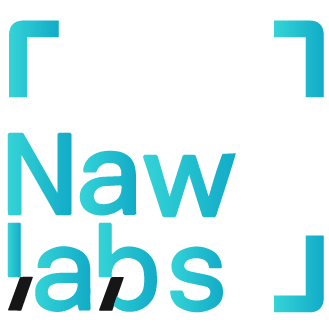
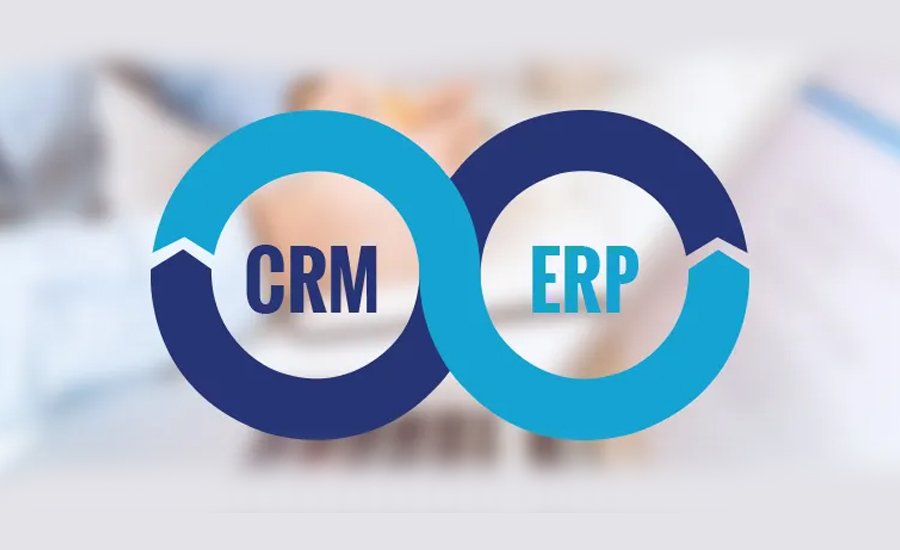

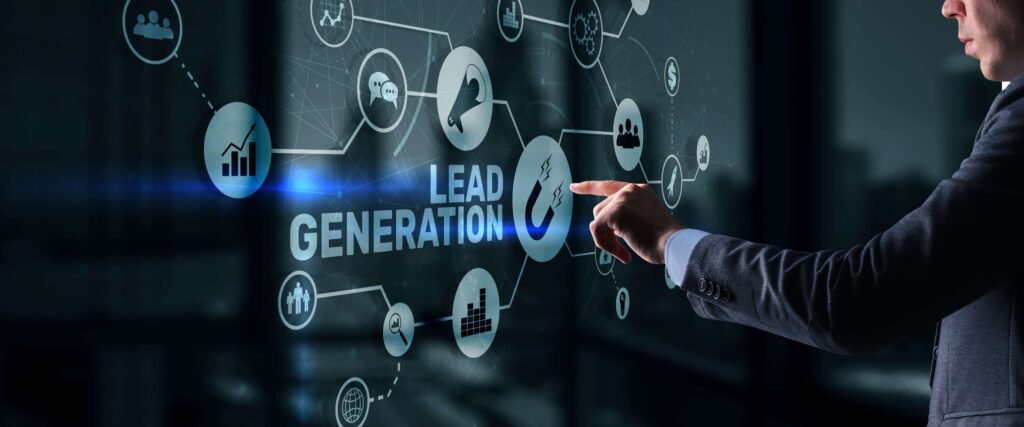
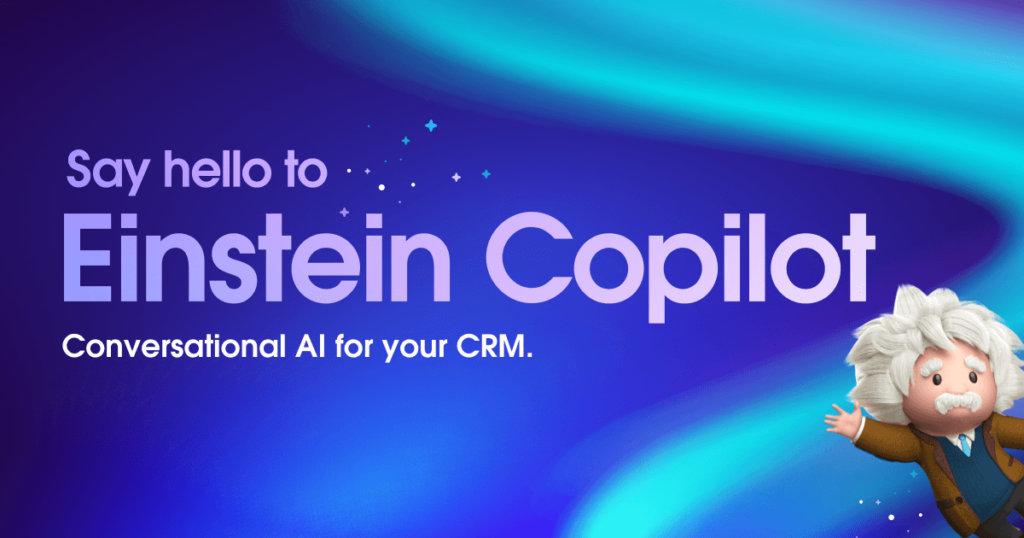

Regardless of which specific tools you utilize, having the right technology in place will allow your new business to get off on the right foot toward lasting success.